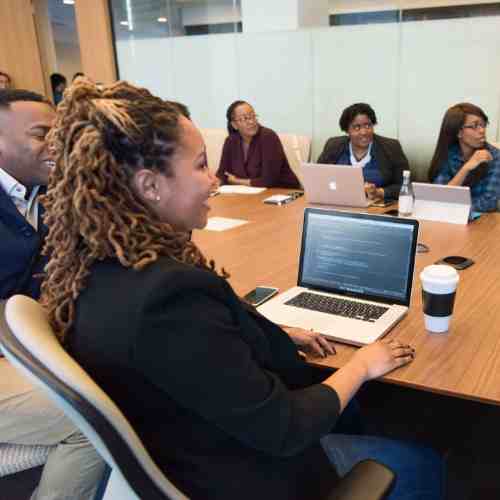R3 Research
The Illinois Criminal Justice Information Authority (ICJIA) is the state's lead agency on justice funding and research. ICJIA's Research Hub provides a host of resources (publications, continuums, dashboards, datasets) to support data-driven decision-making for improved outcomes.
March 13, 2025 | Article
Process Evaluation of Select Restore, Reinvest, and Renew (R3) Funded Grantees: A Summary

The Illinois Cannabis Regulation and Tax Act created the Restore, Reinvest, and Renew (R3) program, which reinvests a portion of cannabis tax revenue into communities experiencing high rates of gun injury, unemployment, child poverty, and incarceration. These grant funds support programming in five priority areas: civil legal aid, economic development, reentry services, violence prevention services, and youth development. Utilizing a mixed methods approach, researchers conducted site-specific process evaluations on the implementation and operations of select R3 grantees. Data sources varied by site, but included observations, interviews, surveys, focus groups, and administrative data. Overall, researchers found that 1) programs valued the needs and input of the communities they served and tailored services to meet those needs; 2) programs...
January 30, 2023 | Article
Restore, Reinvest, and Renew Program Grantmaking and Implementation: An Examination of a State Cannabis Tax-Funded Grant Program’s Inaugural Performance Period

The Restore, Reinvest, and Renew (R3) program was created through the legalization of adult recreational cannabis use in Illinois. Program funds are used to reduce gun violence through intervention and prevention, improve re-entry and diversion services for people involved with the criminal justice system, provide access to legal representation and advice, encourage investment and economic growth, enhance youth development, and support programs that improve the social determinants of health. The current report details the R3 program implementation process (including grantmaking, grant review, and funding) during the program's inaugural period of performance, June 25, 2019 to January 31, 2022. During the first round of funding, the R3 program received over 400 applications and funded 80 community-based programs.
October 22, 2021 | Article
The Illinois Restore, Reinvest, and Renew (R3) Grant Program: Examining Grant Applicant Feedback

The Cannabis Regulation and Tax Act legalized adult-use cannabis in Illinois on January 1, 2020. In addition to limiting enforcement and prosecution of cannabis-related offenses and providing a source of state revenue, the Act established the Restore, Reinvest, and Renew grant program (R3). Administered by the Illinois Criminal Justice Information Authority (ICJIA), R3 directs a significant portion of cannabis revenue toward building equity in communities that have been ravaged by violence and disproportionately impacted by historical criminal justice system overuse and economic disinvestment. This brief report highlights results of a feedback survey provided to R3 grant program applicants regarding their application experiences. Overall, survey respondents appeared satisfied with the process and offered recommendations to consider for im...
July 23, 2020 | Article
Violence Prevention: Basic Ideas for Approaches and Coordination

Violence is a pervasive part of society with severe and long-lasting negative consequences for health and well-being. In Illinois, interpersonal violence takes many shapes and affects people across the state. Partnerships to reduce interpersonal violence can benefit from a mutual understanding of the variety of violence prevention approaches. To support understanding and collaboration, this article discusses fundamental ideas and important terms related to efforts focused on preventing violence.
July 15, 2020 | Article
Individual and Community Trauma: Individual Experiences in Collective Environments

Trauma, which refers to an emotional response from circumstances deemed as harmful, can have negative, long-term impacts on an individual’s mental and physical health. This article examines the literature on how trauma experienced at the individual-level is influenced by trauma experienced at the community-level and summarizes how each is typically defined and addressed. While much of the focus has been on addressing trauma at the individual level, trauma at the community level directly impacts individual experiences. The Social Ecological Model indicates individual trauma cannot truly be addressed without also addressing community-level factors, including housing, education, and employment opportunities.
May 15, 2020 | Article
Civil Legal Aid in Illinois

Civil legal aid organizations provide free legal representation and other services on civil court matters to low-income individuals. While research indicates clients who receive civil legal aid often have more favorable outcomes, these organizations face many barriers to providing assistance that efficiently meets the diverse needs of their clients. This article provides an overview of civil legal aid, with a focus on Illinois where applicable, and discusses challenges and innovations in provision of civil legal services.
May 12, 2020 | Article
Developing, Enhancing, and Supporting Local Economic Conditions to Address Risk Factors for Crime

Economic development encourages growth in the economy, increases employer and worker productivity, and enhances the standard of living for all. Economic development is essential in the effort against poverty. Programmatic interventions that promote a healthy economy while alleviating poverty in communities include skill-building to improve the quality of labor supply and/or increasing the demand for workers. However, experimental evidence and guidance about best practices in the field of economic development are limited. This article examines the relationship between poverty, risk factors for criminal offending, and economic development programming. By successfully addressing economic disparity, poverty, and other risk factors, policymakers can encourage economic development, reduce crime, and positively impact communities throughout the ...
March 3, 2020 | Article
Youth Development: An Overview of Related Factors and Interventions

Research has found that adolescence sets the course for an individual’s long-term social, cognitive, emotional, and cultural development. This review examines literature on positive youth development, risk/protective factors, and the research behind select interventions. Overall, the interventions discussed highlight the many factors that play a role in positive youth development and underline how significant addressing risk and protective factors can be.
December 19, 2019 | Article
An Overview of Evidence-Based Practices and Programs in Prison Reentry

Individuals released from prison often face immediate challenges related to employment, housing, behavioral health, and social support. While high recidivism rates among returning citizens continue to be an issue in many communities, certain reentry programs have shown effectiveness in improving outcomes for released individuals. This article provides an overview of reentry needs and best practices for reentry programming. Examples of promising reentry programs are provided. Strategies for parole officers are briefly discussed, as parole is often directly related to the reentry process. Evidence-based practices have emerged from the existing research on reentry, but high-quality, replicable research on programming will continue to be necessary to advance the “what works” discourse.
December 16, 2019 | Article
Logic Models: Practical Planning to Reach Program Goals

This brief highlights the benefits of, components to, and considerations for developing a logic model. For a downloadable logic model template, please see the PDF version of the brief.
